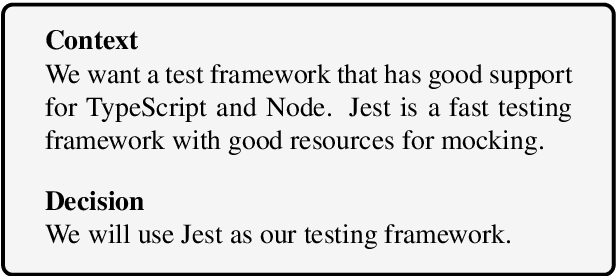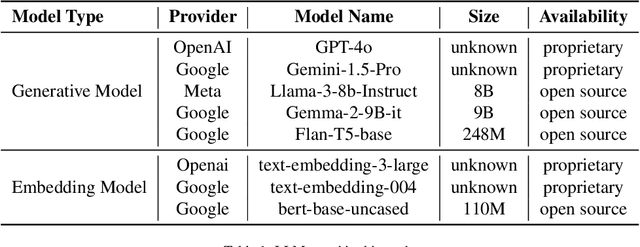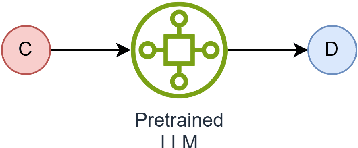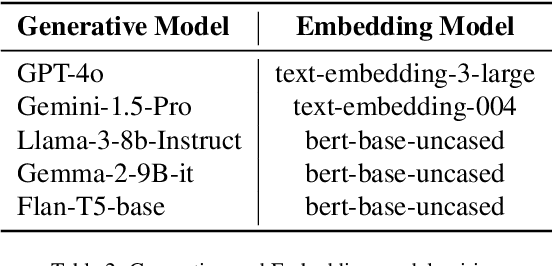Adyansh Kakran
DRAFT-ing Architectural Design Decisions using LLMs
Apr 11, 2025



Abstract:Architectural Knowledge Management (AKM) is crucial for software development but remains challenging due to the lack of standardization and high manual effort. Architecture Decision Records (ADRs) provide a structured approach to capture Architecture Design Decisions (ADDs), but their adoption is limited due to the manual effort involved and insufficient tool support. Our previous work has shown that Large Language Models (LLMs) can assist in generating ADDs. However, simply prompting the LLM does not produce quality ADDs. Moreover, using third-party LLMs raises privacy concerns, while self-hosting them poses resource challenges. To this end, we experimented with different approaches like few-shot, retrieval-augmented generation (RAG) and fine-tuning to enhance LLM's ability to generate ADDs. Our results show that both techniques improve effectiveness. Building on this, we propose Domain Specific Retreival Augumented Few Shot Fine Tuninng, DRAFT, which combines the strengths of all these three approaches for more effective ADD generation. DRAFT operates in two phases: an offline phase that fine-tunes an LLM on generating ADDs augmented with retrieved examples and an online phase that generates ADDs by leveraging retrieved ADRs and the fine-tuned model. We evaluated DRAFT against existing approaches on a dataset of 4,911 ADRs and various LLMs and analyzed them using automated metrics and human evaluations. Results show DRAFT outperforms all other approaches in effectiveness while maintaining efficiency. Our findings indicate that DRAFT can aid architects in drafting ADDs while addressing privacy and resource constraints.
Engineering LLM Powered Multi-agent Framework for Autonomous CloudOps
Jan 14, 2025Abstract:Cloud Operations (CloudOps) is a rapidly growing field focused on the automated management and optimization of cloud infrastructure which is essential for organizations navigating increasingly complex cloud environments. MontyCloud Inc. is one of the major companies in the CloudOps domain that leverages autonomous bots to manage cloud compliance, security, and continuous operations. To make the platform more accessible and effective to the customers, we leveraged the use of GenAI. Developing a GenAI-based solution for autonomous CloudOps for the existing MontyCloud system presented us with various challenges such as i) diverse data sources; ii) orchestration of multiple processes; and iii) handling complex workflows to automate routine tasks. To this end, we developed MOYA, a multi-agent framework that leverages GenAI and balances autonomy with the necessary human control. This framework integrates various internal and external systems and is optimized for factors like task orchestration, security, and error mitigation while producing accurate, reliable, and relevant insights by utilizing Retrieval Augmented Generation (RAG). Evaluations of our multi-agent system with the help of practitioners as well as using automated checks demonstrate enhanced accuracy, responsiveness, and effectiveness over non-agentic approaches across complex workflows.
 Add to Chrome
Add to Chrome Add to Firefox
Add to Firefox Add to Edge
Add to Edge